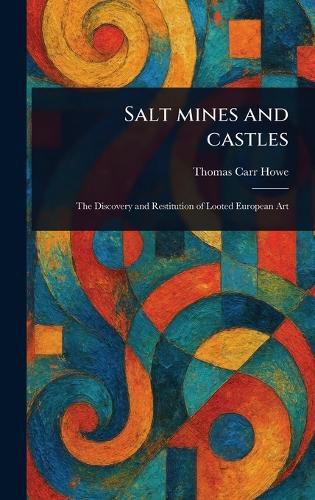Readings Newsletter
Become a Readings Member to make your shopping experience even easier.
Sign in or sign up for free!
You’re not far away from qualifying for FREE standard shipping within Australia
You’ve qualified for FREE standard shipping within Australia
The cart is loading…






This title is printed to order. This book may have been self-published. If so, we cannot guarantee the quality of the content. In the main most books will have gone through the editing process however some may not. We therefore suggest that you be aware of this before ordering this book. If in doubt check either the author or publisher’s details as we are unable to accept any returns unless they are faulty. Please contact us if you have any questions.
"Salt Mines and Castles: The Discovery and Restitution of Looted European Art" by Thomas Carr Howe explores a crucial, yet often overlooked, aspect of World War II: the systematic looting of European art and cultural heritage by the Nazi regime, and the subsequent Allied effort to recover and return these priceless treasures.
This historical account details the complex process of locating confiscated art hidden in disparate locations, from salt mines to castles, across war-torn Europe. Howe meticulously documents the challenges involved in identifying, cataloging, and ultimately restituting these works to their rightful owners after the war.
A significant contribution to the history of World War II and European art, "Salt Mines and Castles" sheds light on the immense effort to salvage and preserve cultural heritage amidst the devastation of war. This republication makes available a vital resource for anyone interested in art restitution, looted art, and the broader impact of World War II on the artistic landscape of Europe.
This work has been selected by scholars as being culturally important, and is part of the knowledge base of civilization as we know it.
This work is in the public domain in the United States of America, and possibly other nations. Within the United States, you may freely copy and distribute this work, as no entity (individual or corporate) has a copyright on the body of the work.
Scholars believe, and we concur, that this work is important enough to be preserved, reproduced, and made generally available to the public. We appreciate your support of the preservation process, and thank you for being an important part of keeping this knowledge alive and relevant.
$9.00 standard shipping within Australia
FREE standard shipping within Australia for orders over $100.00
Express & International shipping calculated at checkout
Stock availability can be subject to change without notice. We recommend calling the shop or contacting our online team to check availability of low stock items. Please see our Shopping Online page for more details.
This title is printed to order. This book may have been self-published. If so, we cannot guarantee the quality of the content. In the main most books will have gone through the editing process however some may not. We therefore suggest that you be aware of this before ordering this book. If in doubt check either the author or publisher’s details as we are unable to accept any returns unless they are faulty. Please contact us if you have any questions.
"Salt Mines and Castles: The Discovery and Restitution of Looted European Art" by Thomas Carr Howe explores a crucial, yet often overlooked, aspect of World War II: the systematic looting of European art and cultural heritage by the Nazi regime, and the subsequent Allied effort to recover and return these priceless treasures.
This historical account details the complex process of locating confiscated art hidden in disparate locations, from salt mines to castles, across war-torn Europe. Howe meticulously documents the challenges involved in identifying, cataloging, and ultimately restituting these works to their rightful owners after the war.
A significant contribution to the history of World War II and European art, "Salt Mines and Castles" sheds light on the immense effort to salvage and preserve cultural heritage amidst the devastation of war. This republication makes available a vital resource for anyone interested in art restitution, looted art, and the broader impact of World War II on the artistic landscape of Europe.
This work has been selected by scholars as being culturally important, and is part of the knowledge base of civilization as we know it.
This work is in the public domain in the United States of America, and possibly other nations. Within the United States, you may freely copy and distribute this work, as no entity (individual or corporate) has a copyright on the body of the work.
Scholars believe, and we concur, that this work is important enough to be preserved, reproduced, and made generally available to the public. We appreciate your support of the preservation process, and thank you for being an important part of keeping this knowledge alive and relevant.